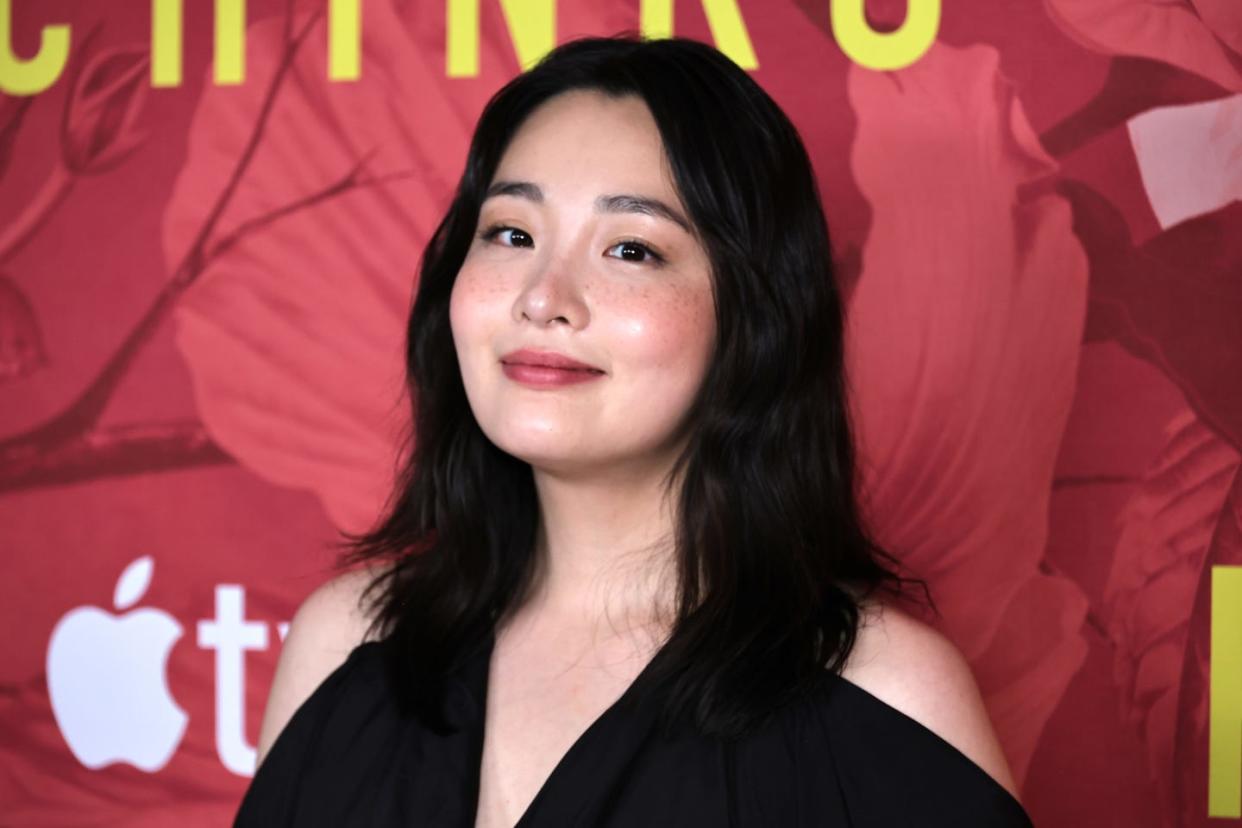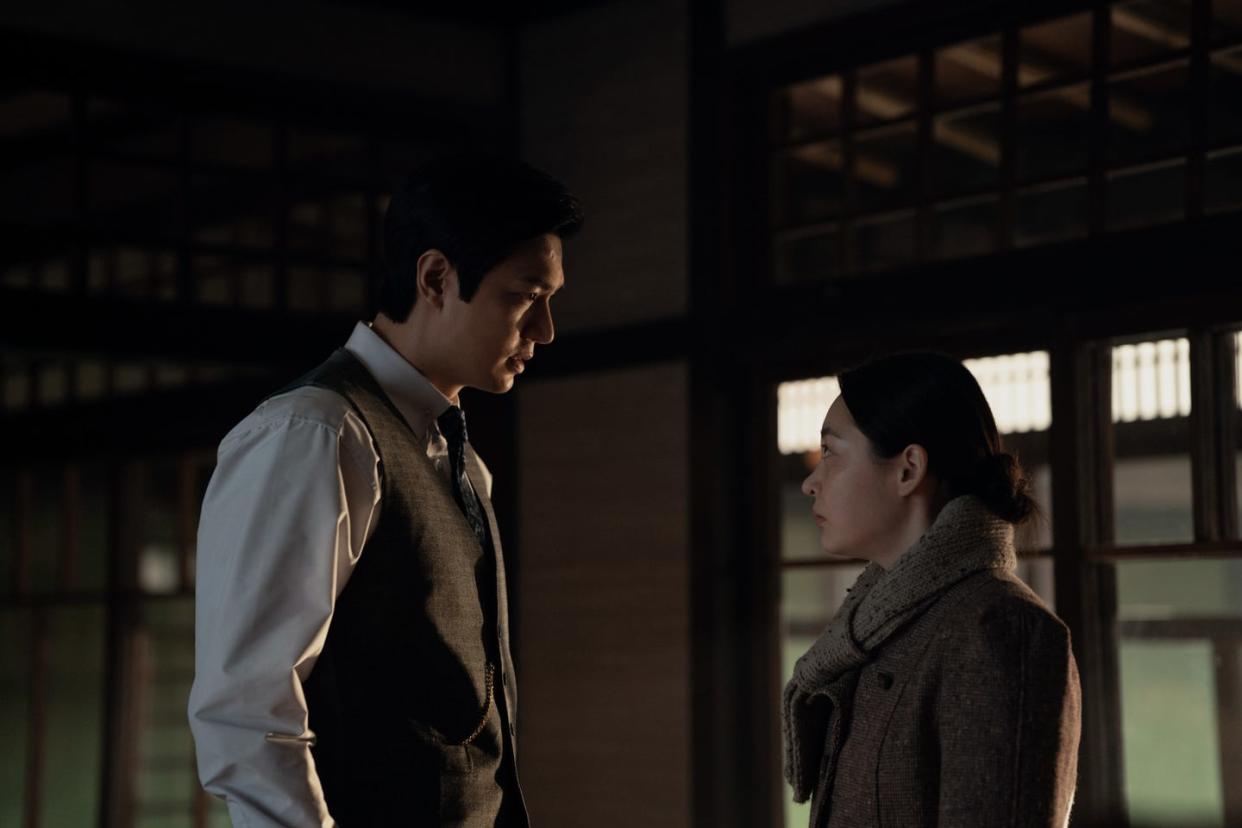Minha Kim Reveals What Happened to Sunja Between 'Pachinko' Seasons One and Two

"Hearst Magazines and Yahoo may earn commission or revenue on some items through these links."
Minor spoilers ahead for Pachinko season two.
When Pachinko season two begins, it doesn't quite pick up where season one left off. The show, created by Soo Hugh and based on Min Jin Lee's bestselling book of the same name, follows a Korean woman named Sunja in two different timelines—surviving World War II in Japan, where younger Sunja is played by Minha Kim, and living in 1989 Japan, where older Sunja is played by Academy Award winner Yuh-jung Youn.
The younger Sunja's timeline has jumped ahead seven years between the finale of season one and the first episode of season two; viewers left her last in 1938, when she was selling kimchi on the street, right after her husband, Isak, had been arrested. They meet her again in 1945, and she's still selling kimchi—but resources have gotten scarce, and she's going to have to figure out a new way to support her family.
"We always said every season was going to be a jump, that hopefully by the end, the two timelines collide and meet as the structure of the show," showrunner Soo Hugh tells T&C. "When we last saw Sunja, Isak had just been arrested, taken away. So when we jumped to our second season, we really wanted to show that they survived. They made it. As terrible as Isak's disappearance was, these women carry on."
Ahead of the premiere, Minha Kim chatted with T&C about that seven year time jump and her own Sunja headcanon, Sunja and Hansu's complicated relationship, and the show's message of hope.

What was it like to be back for a second season of this show?
I felt like I was back in my home—it was so good to see everybody all together. Our cast are all over the world, so it's quite hard to gather around. But right after we meet each other again, we were so happy. We just had a huge warm hug with each other. It's just always so happy to [be] together.
Actually, I was quite nervous to be on the set again because after the huge success of the first season, I felt like I had a huge responsibility towards Sunja to make it even better. And there was time jump since the first season, so I was considering how to melt [that] time into my characters and how to carry on the stories. But at the same time, I was very excited to be back and I was really, really happy [to film Pachinko] those six months.
You mentioned this, but there's a seven year time jump for your character between season one and season two. What was that like for you as an actress?

I had to set a storyline in those seven years, even though it didn't appear on the show. I had to make stories [in my head] and instinctively get into the character right away. As an actress, it was really, really hard to sort out how to maintain the character, but simultaneously to change their character. I just wanted to make Sunja [in season two] genuine and just like Sunja, but she had a new environment. She's surrounded by new people, their kids are growing, and she had a great responsibilities towards the family. So a lot of things has changed, but the one thing that I didn't want to change was the belief in herself—the hope and joy and the affections toward the family, I wanted to maintain those kind of things. It was hard, but mostly felt very natural.
What do you think happened to her between when we last saw her in the season one finale and when we meet her again in season two?
Well, I think she got more flexible and she's faster in getting used to all the new things. She had to protect her family, and she had to protect herself. I think she's stronger. For myself, I thought that for the first season, I think Sunja was the root of the tree, but in the seven years, she has grown up, she's ready to bloom and she's just ready to fall down or to grow again. So she's more flexible, stronger, and resilient.
So much of this season is about what love looks like: between Sunja and her mom, Sunja and her sons, even Sunja and her husband, Isak. How do you think she navigates these different types of love?
She has a huge, warm love inside herself. I think she's just naturally born with it. If there were no love inside of her, there's no way that she could navigate and sort out all the different types of love. She's just instinctively knows [love is key] to protect everything.
How would you describe the love Sunja has for Hansu? It’s complicated!

It is complicated! Every time I wanted to explain Sunja's emotions towards Hansu, there are no words that can explain it. It's just so complicated. She loves him so much, but at the same time, she hates him. She just wants him to just disappear in her life, but she cannot resist it. He's there, all the time. For the seven years, or more than seven years, I think she might have imagined every single day, what if I meet Hansu again? I think she constantly thought of that, imagining that they [would] reunite, but she just hated Hansu as well. In the first season, I felt like Hansu destroys Sunja. There was a period of time that Hansu destroys her, but as the time goes by, she realized that maybe the love towards Hansu made her that strong and that made the power of her to survive. It's that complicated—Hansu is the element that cannot get rid of in Sunja's life.
[When Hansu and Sunja reunite], she first resists him, it's because he destroys her. She's like, 'no, not again, why are you still appearing my life?' But then she realized that she cannot live without him because she needs his help to protect herself and her family. Now, she's not alone. She has two kids. She has Kyunghee, Yoseb, Isak— in order to protect her and her family, she just needs Hansu.
Much of your storyline is set during 1945, particularly when Japan was being bombed during World War II. As an actress, how do you navigate portraying this very real and painful history?
I couldn't even imagine how it would feel like to be in the middle of the war. But when I was on the set [filming Sunja leaving the city], and I wore the wardrobe and there were a lot of crowds, and when the chaotic exit just begins, I couldn't even feel anything. It's not about the feelings, it's just about escaping and survival. There's no time to feel anything, but to again, survive and protect. There's no time for grief. It's just about the survival.
We needed to understand that historical time and to imagine how would it be because it's so different now. I studied a lot, I tried to research a lot of historical events. I [listened] to a lot of lectures, and I read a lot of books about just about the historical events that happened in that time. But just to study, just to know the concept of that era, because I just wanted to be certain about that.
I also need to ask you about Pachinko's opening credits, which are so special and unique. What was it like dancing and filming them?
It's just happy! It's just happy and fun, I had no reason to think of anything, I just [had to] dance for one hour. It was crazy. We were yelling and laughing, it was just adorable. It represents our show, as well, how [the characters] kept trying to find a hope and joy during chaos.
What do you hope viewers take away from season two of Pachinko?
That there's always a hope and light. Even if they feel [the world is] so depressing and even though they think they're alone, but there is a love and hope, really. You can find it.
You Might Also Like
